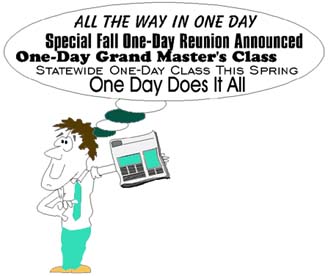

 Rex
R. Hutchens, 33, Grand Cross & Sean D. Graystone, 33
Rex
R. Hutchens, 33, Grand Cross & Sean D. Graystone, 33
Ideas, such as those related to Ritual in Masonry,
deserve to stand or fall on their own merits and not to be condemned for
their novelty or rejected outright because they may violate a custom whose
time has passed.
This Spring, Oklahoma will have three one-day classes for Blue Lodge Masons (March 22nd in Guthrie, April 24th in McAlester, and July 19th in Tulsa). Their approach to this controversial method of increasing membership deserves careful examination. These classes are restricted to those Masons who have not progressed during the last 30 years. It should be recognized that, at least in many cases, the candidates may not be solely at fault for their lack of progression. Investigating committees and coaches are often ill-prepared for the responsibilities they are given. This can result in candidates who do not know what is going to be expected of them until they have already been initiated. There are Lodges that make the most recently obligated Master Mason a coach, whether or not he has any understanding of the work he has learned, because the memory work is fresh in his mind.
When this is followed by sessions with a coach who is unable to assist the candidate in the techniques of the art of memory or to answer adequately even trivial questions related to basic Masonic principles and symbolism, the result has too often been candidates who elect to drop out rather than continue a process that is both discouraging and difficult. In effect, the Lodge fails the candidate rather than the candidate failing Masonry.
These classes in Oklahoma are part of a burgeoning trend in American Masonry to accelerate the initiative process in the Craft Lodges. It is hardly surprising that this trend has met considerable resistance by many Masons who feel this is an innovation injurious to Masonry.
An examination of the early history of Masonry suggests a possible different perspective. When there were only two Degrees, they appear to have been given on the same day. Even the introduction of the Third Degree around 1725 did not necessarily change this custom.
Though many early catechisms exist, their authenticity is often problematical. As well, we have little knowledge as to whether they were an integral part of the Ritual-an exercise performed in a tiled Lodge for the benefit of all members-or as a more conventional catechism memorized by new initiates. The questions and answers could, for example, have been the entire Ritual and given between the Master and Senior Warden. Knoop, Jones, and Hamer comment that the early catechisms possibly “were rehearsed at lodge meetings, either when no candidate was being admitted or after the admission of a candidate, in order to refresh the memory of, or to instruct, the masons present,...” (Early Masonic Catechisms, pp. 11-12).
Some of these manuscripts reveal very few questions, as in the case of The Whole Institutions of Free-Masons Opened (1725) where there are only 15 questions given and no obligation. On the other hand, The Graham MS (1726) has 33 questions and the answer to the last one is a very lengthy dissertation on Hiram the artisan, the Tower of Babel, the construction of the Temple, and Christ and the twelve Apostles that cannot be supposed to have been memorized by a candidate. Still no obligation is given, or even hinted at, in the manuscript. Perhaps the last lengthy answer was delivered as a lecture as part of the Ritual. Certainly an obligation, even very early in the history of the Craft, can be assumed. A hint of the usual penalty in the obligation for the Entered Apprentice Degree may be found in The Edinburgh Register House MS of 1696.
Early Masonry acquired candidates by solicitation, and rote memorization was an integral part of the educational process then. This is no longer so, and the resultant change in style in education demands a reexamination of our instructional methods. We should not change merely to attract a greater membership. By the same standard, we should not avoid change merely to maintain ineffective instructional methods whose quaintness we may have found attractive. Even Confucius knew that only the very wise and the very stupid cannot change.
There will always be, as there now is, both members interested in Ritual and others interested in the moral instruction and conviviality only our Fraternity can give. Our gentle Craft has never remained static and never will. Ideas deserve to stand or fall on their own merits and not to be condemned for their novelty or rejected outright because they violate a custom whose time may have passed. Under no circumstances should a Fraternity based on the high moral ideals we seek to emulate allow itself to be divided, sometimes bitterly, by the free and open discussion of the ways to handle change.
We should remember well the charge given the Wardens at
the Scottish Rite installation, “...teach the Brethren with precept and
example to bear with the infirmities of each other and especially to beware
of obstinacy and pride of opinion, out of which grow most difficulties
among men and Masons.” It is only united as Brethren that we shall arrive
at any practical solutions to our problems.